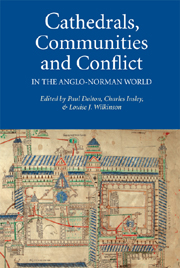Book contents
- Frontmatter
- Contents
- List of Illustrations
- List of Contributors
- Preface
- List of Abbreviations
- Introduction
- 1 The Dangers of Invention: The Sack of Canterbury, 1011, and the ‘theft’ of Dunstan's Relics
- 2 Remembering Communities Past: Exeter Cathedral in the Eleventh Century
- 3 Communities, Conflict and Episcopal Policy in the Diocese of Lichfield, 1050–1150
- 4 The Acta archiepiscoporum Rotomagensium and Urban Ecclesiastical Rivalry in Eleventh-Century Rouen
- 5 Cathedrals and the Cult of Saints in Eleventh-and twelfth-Century Wales
- 6 A Bishop and His Conflicts: Philip of Bayeux (1142–63)
- 7 Ecclesiastical Responses to War in king Stephen's Reign: The Communities of Selby Abbey, Pontefract Priory and York Cathedral
- 8 Secular Cathedrals and the Anglo-Norman Aristocracy
- 9 The Lives of Thomas Becket and the Church of Canterbury
- 10 Caught in the Cross-Fire: Patronage and Institutional Politics in Late twelfth-Century Canterbury
- 11 Crown, Cathedral and Conflict: King John and Canterbury
- 12 The English Monasteries and their French Possessions
- Index of People and Places
- Other Volumes in Studies in the History of Medieval Religion
11 - Crown, Cathedral and Conflict: King John and Canterbury
Published online by Cambridge University Press: 12 September 2012
- Frontmatter
- Contents
- List of Illustrations
- List of Contributors
- Preface
- List of Abbreviations
- Introduction
- 1 The Dangers of Invention: The Sack of Canterbury, 1011, and the ‘theft’ of Dunstan's Relics
- 2 Remembering Communities Past: Exeter Cathedral in the Eleventh Century
- 3 Communities, Conflict and Episcopal Policy in the Diocese of Lichfield, 1050–1150
- 4 The Acta archiepiscoporum Rotomagensium and Urban Ecclesiastical Rivalry in Eleventh-Century Rouen
- 5 Cathedrals and the Cult of Saints in Eleventh-and twelfth-Century Wales
- 6 A Bishop and His Conflicts: Philip of Bayeux (1142–63)
- 7 Ecclesiastical Responses to War in king Stephen's Reign: The Communities of Selby Abbey, Pontefract Priory and York Cathedral
- 8 Secular Cathedrals and the Anglo-Norman Aristocracy
- 9 The Lives of Thomas Becket and the Church of Canterbury
- 10 Caught in the Cross-Fire: Patronage and Institutional Politics in Late twelfth-Century Canterbury
- 11 Crown, Cathedral and Conflict: King John and Canterbury
- 12 The English Monasteries and their French Possessions
- Index of People and Places
- Other Volumes in Studies in the History of Medieval Religion
Summary
Canterbury cathedral, its archbishops, monks and the relics of its saints hold a prominent place in the events of the turbulent reign of King John. The disputed election to the archbishopric, resulting in the choice of Stephen Langton at the behest of Pope Innocent III, the king's refusal to acknowledge this, and the ensuing sentences of interdict and excommunication are all well known. This essay will consider specific aspects of the relationship between king, cathedral and archbishop, focusing on John's religious outlook, and on the contrast between royal actions and their portrayal in the major narrative histories of the day. It will argue that Canterbury cathedral ranked alongside Bury St Edmunds and Westminster as an important centre of royal pilgrimage in the early years of John's reign, a role that has been unrecognised hitherto. The king's pilgrimages demonstrate that the cult of St Thomas Becket was as important to John as those of canonised kings such as St Edmund the Martyr and St Edward the Confessor. In addition, John's activity stands in sharp contrast to the notion that Becket's status as a ‘political’ or ‘anti-royal’ saint in some way precluded royal efforts to appeal for the saint's intercession. After brief consideration of the influence of Hubert Walter (archbishop of Canterbury 1193–1205) on John, the essay will examine the relationship between the king and the Canterbury monks in the years 1205 to 1213, a period usually considered in terms of the struggle between king and pope over the election of Stephen Langton as archbishop.
- Type
- Chapter
- Information
- Cathedrals, Communities and Conflict in the Anglo-Norman World , pp. 203 - 220Publisher: Boydell & BrewerPrint publication year: 2011



